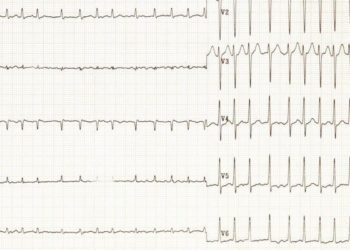Higher protein doses do not improve outcomes in mechanically ventilated patients with high nutritional risk
1. Time-to-discharge-alive from the hospital was similar among both high- and regular-protein groups.
2. There was no significant inter-group difference in 60-day mortality rate, but the higher protein group was found to be more harmful in patients with acute kidney injury.
Evidence Rating Level: 1 (Excellent)
Study Rundown: Nutrition guidelines for patients admitted to the intensive care unit include a variety of weight-based protein doses. However, there is little consensus on whether higher protein doses help optimize patient clinical outcomes. This randomized controlled trial aimed to assess clinical outcomes in critically ill and mechanically ventilated patients assigned to high (greater than 2.2 g/kg/d) versus standard protein (less than or equal to 1.2 g/kg/d) doses. The primary outcome was time-to-discharge-alive within 60 days of admission to the intensive care unit (ICU) while a key secondary outcome included all-cause mortality. According to study results, supplementation with a higher protein dose does not improve clinical outcomes and, in fact, results in worse clinical outcomes among patients with acute kidney injury. This study was limited by a lack of comparison between protein and no-protein groups to assess whether protein supplementation affected clinical outcomes.
Click to read the study in The Lancet
Relevant Reading: Energy-Dense versus Routine Enteral Nutrition in the Critically Ill
In-depth [randomized-controlled trial]: Between Jan 17, 2018, and Dec 3, 2021, 4322 patients were assessed for eligibility across 85 ICUs across 16 countries. Included were patients ≥ 18 years admitted to the ICU with mechanical ventilation. Altogether, 1301 patients (645 in the high-protein and 656 in the usual-protein group) were included in the final analysis. The primary outcome of time-to-discharge-alive from the hospital was comparable in both groups (46.1% in high-protein, 95% confidence interval [CI] 42.0-50.1% vs. 50.2% in usual-protein, 95% CI 46.0-54.3%, hazard ratio [HR] 0.91, p=0.27). This was also the case for 60-day mortality (34.6% in high-protein vs. 32.1% in usual-protein, relative risk [RR] 1.08, 95% CI 0.92-1.26). Overall, findings from this study suggest that high protein does not improve hospital outcomes among mechanically ventilated ICU patients compared to standard protein doses.
Image: PD
©2023 2 Minute Medicine, Inc. All rights reserved. No works may be reproduced without expressed written consent from 2 Minute Medicine, Inc. Inquire about licensing here. No article should be construed as medical advice and is not intended as such by the authors or by 2 Minute Medicine, Inc.






![The ABCD2 score: Risk of stroke after Transient Ischemic Attack (TIA) [Classics Series]](https://www.2minutemedicine.com/wp-content/uploads/2013/05/web-cover-classics-with-logo-medicine-BW-small-jpg-75x75.jpg)
